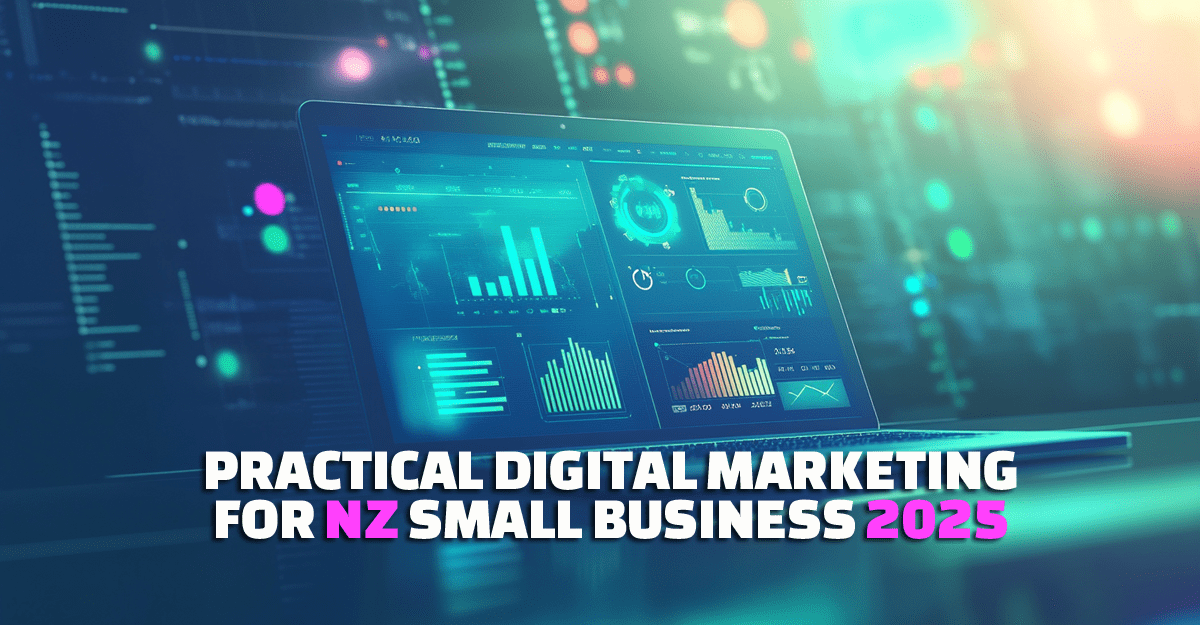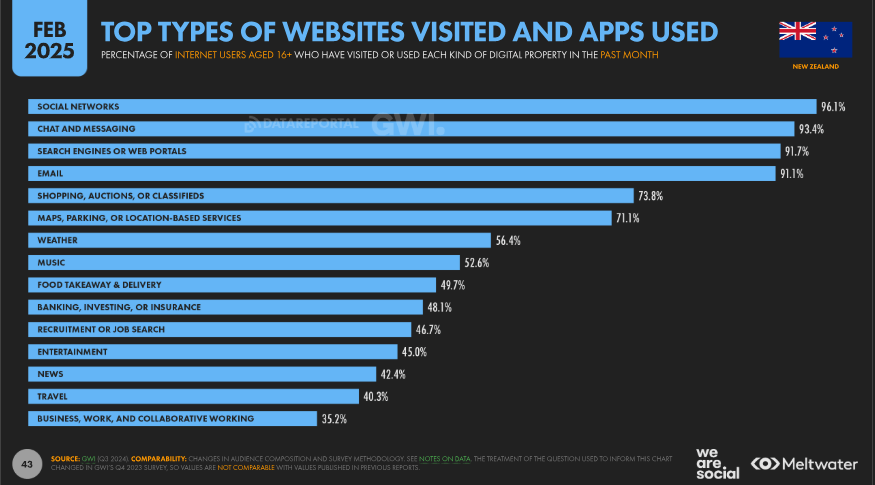Struggling to make your digital marketing work harder for your New Zealand business? You're not alone—many small business owners find themselves spending time and money without seeing the returns they expected. Effective digital marketing for small business isn't about being everywhere at once or using every new tool that appears. It's about focusing on what actually works for Kiwi customers and implementing strategies that deliver measurable results.
This article gives you practical, actionable advice you can use immediately. We'll cover everything from understanding your local audience to choosing the right platforms and measuring what matters. Whether you're running a café in Christchurch, a retail store in Wellington, or offering services across Aotearoa, these approaches will help you connect with customers and grow your business.
What Makes Digital Marketing Effective for Small Businesses?
Effective digital marketing means using the right online channels to reach your ideal customers, engage them with valuable content, and convert them into paying clients—all while maintaining a positive return on investment. For New Zealand small businesses, effectiveness comes from understanding local market dynamics and customer preferences rather than simply copying international trends.
The most successful Kiwi businesses focus on three key elements:
- Clear understanding of their specific target audience
- Consistent messaging across chosen platforms
- Regular measurement and adjustment based on performance data
Unlike large companies with massive budgets, small businesses in New Zealand benefit from being agile and authentic. Your size allows you to build genuine relationships with customers and respond quickly to market changes.
Understanding Your Kiwi Audience
Before spending any money on ads or content, you need to know who you're trying to reach. New Zealand customers have distinct characteristics that influence how they respond to digital marketing.
Local Preferences Matter Kiwi consumers tend to trust businesses that understand local culture and values. They appreciate brands that acknowledge New Zealand's unique environment and community spirit. When planning your marketing, consider how your business fits into the local landscape rather than presenting as a generic international brand.
Digital Behaviour Patterns Recent data shows New Zealanders spend significant time online, with particular engagement on, well, see for yourself:
The specific sites will vary, depending on your audience demographics and the reasons why they're online.
Understanding these patterns helps you allocate resources to channels where your audience actually spends time rather than spreading yourself too thin across every possible platform.
A lot depends on who your audience is and what stage of life they’re in.
- Teenagers and people in their early 20s spend more time on TikTok, Instagram and YouTube for entertainment, trends and creators.
- Late-20s to 40-somethings still use Instagram and YouTube heavily, but also rely on Facebook and Messenger/WhatsApp to keep up with friends, community groups and local businesses.
- Over-45s lean more on Facebook (including Groups and Marketplace), search and email, and are more likely to check news, weather and banking sites.
- If you’re selling to professionals or recruiting, LinkedIn and job portals rise in importance because that’s where career-minded users go with a work mindset.
User intent matters just as much.
- People looking for ideas and inspiration scroll discovery platforms (TikTok/Instagram Reels, YouTube Shorts, Pinterest).
- When they’re researching a purchase, they head to search engines, YouTube reviews and comparison sites.
- If the task is local or urgent -“near me”, directions, opening hours—they use Maps first, often followed by your Google Business Profile, website or a booking tool.
- Hungry right now? Food delivery apps win.
- Planning travel? Maps, weather and travel sites spike.
- Want a quick answer from a brand? They’ll message you on Messenger, WhatsApp or Instagram DMs rather than fill in a form.
So match channel to both demographic and intent. A suburban café targeting office workers might use Instagram Reels and TikTok for daily specials, keep Google Maps and opening hours bang-up-to-date, and run lunchtime offers in food delivery apps. A tradie after homeowners 35+ could post proof-of-work videos on Facebook and YouTube, be easy to find on Maps with strong reviews, and capture quotes via a simple mobile-friendly form—then follow up with email. Right people, right place, right moment.
Setting Clear Marketing Goals
Without specific goals, you can't measure whether your marketing is effective. Many small business owners make the mistake of vague objectives like "get more customers" without defining what that means in practical terms.
SMART Goal Framework Use this approach to create meaningful targets:
- Specific: "Increase website traffic from Auckland residents"
- Measurable: "Grow email list by 200 subscribers per month"
- Achievable: "Generate 10 qualified leads weekly"
- Relevant: "Align with overall business growth targets"
- Time-bound: "Achieve within the next quarter"
Common Small Business Marketing Goals
- Increase local brand awareness
- Generate qualified leads
- Boost online sales
- Improve customer retention
- Enhance online reputation
Your goals should reflect your business stage and resources. A new business might focus on awareness, while an established one might prioritise customer retention.
Building Your Online Foundation
Your website and basic online presence form the foundation of all your digital marketing efforts. Without this solid base, other activities won't deliver their full potential.
Professional Website Essentials Your website needs to:
- Load quickly on all devices
- Provide clear information about your products or services
- Make contact and purchasing easy
- Represent your brand consistently
- Include basic search engine optimisation
Many New Zealand small businesses make the mistake of treating their website as a digital brochure rather than their most important marketing tool. Your site should work actively to convert visitors into customers.
Local Business Listings Claim and optimise your profiles on:
- Google Business Profile
- Local directories like Yellow NZ
- Industry-specific platforms
- Social media business pages
Consistent business information across these platforms improves your local search visibility and helps customers find accurate details about your business.
Content That Connects with Kiwi Customers
Content marketing remains one of the most effective digital marketing strategies for small businesses because it builds trust and demonstrates expertise while attracting qualified traffic.
Creating Relevant Content Focus on topics that address your customers' needs and questions. A Wellington plumbing business might create content about preventing common winter pipe issues, while an Auckland café could share behind-the-scenes stories about sourcing local ingredients.
Content Formats That Work
- Blog posts answering common customer questions
- How-to guides related to your products or services
- Customer success stories and case studies
- Local event coverage or community involvement
- Video content showing your business in action
The most effective content provides genuine value rather than just promoting your business. When customers find your content helpful, they're more likely to trust your brand and choose your services.
Social Media Strategies for NZ Businesses
Social media offers powerful opportunities to connect with local customers, but many small businesses struggle with using these platforms effectively.
Choosing the Right Platforms Rather than maintaining presence everywhere, focus on platforms where your target audience spends time:
- Facebook: Broad demographic reach, good for community building
- Instagram: Visual content, younger audiences
- LinkedIn: B2B services and professional audiences
- TikTok: Creative businesses targeting younger customers
Engagement Over Broadcasting Successful social media marketing involves conversation rather than just posting content. Respond to comments, ask questions, and participate in local discussions. Kiwi customers appreciate businesses that feel accessible and responsive.
Email Marketing That Gets Results
Despite newer channels emerging, email marketing continues to deliver excellent returns for small businesses when done correctly.
Building Your List Organically Focus on growing an engaged subscriber base through:
- Website sign-up forms
- Lead magnets like free guides or discounts
- In-person collection at your physical location
- Partner promotions with complementary businesses
Creating Valuable Newsletters Your emails should provide value beyond promotions. Include:
- Useful tips related to your industry
- Exclusive offers for subscribers
- Updates about local events or news
- Customer highlights and success stories
New Zealand businesses that send regular, valuable emails typically see higher customer retention and increased repeat business.
Local SEO for Kiwi Businesses
Search engine optimisation helps potential customers find your business when they're looking for products or services you offer.
Optimising for Local Search
- Include location-specific keywords naturally in your content
- Ensure your name, address, and phone number are consistent everywhere
- Encourage genuine customer reviews on Google and other platforms
- Create location-specific pages if you serve multiple areas
Google Business Profile Optimisation Your Google profile often appears before your website in local searches. Keep it updated with:
- Current business hours and contact information
- Recent photos of your business and products
- Regular posts about offers and updates
- Responses to all customer reviews
Measuring What Matters
Without tracking results, you can't know what's working or where to improve. Many small business owners make decisions based on assumptions rather than data.
Key Performance Indicators Track metrics that directly relate to your business goals:
- Website traffic and source
- Conversion rates (forms filled, products purchased)
- Social media engagement rates
- Email open and click-through rates
- Customer acquisition cost
Regular Review Process Set aside time weekly or monthly to:
- Review performance against your goals
- Identify what's working well
- Spot opportunities for improvement
- Adjust your strategy based on data
The most effective digital marketers test different approaches, measure results, and double down on what delivers the best returns.
Budgeting for Digital Marketing
Limited budgets require careful allocation to maximise impact. The most effective approach involves balancing immediate returns with long-term brand building.
Allocating Your Budget Consider splitting your budget across:
- Immediate lead generation (paid ads, promotions)
- Medium-term growth (content creation, SEO)
- Long-term assets (website improvements, email list building)
Cost-Effective Tactics Many effective strategies require more time than money:
- Content creation and optimisation
- Social media engagement
- Email marketing
- Community participation
- Customer referral programs
New Zealand small businesses often find that a consistent, focused approach delivers better results than sporadic large spends.
Common Digital Marketing Mistakes to Avoid
Learning from others' mistakes can save you time and money. Here are frequent pitfalls for New Zealand small businesses:
Trying to Do Everything Spreading limited resources across too many platforms dilutes your effectiveness. It's better to excel on two or three channels than to perform poorly on six.
Inconsistent Messaging Customers get confused when your website, social media, and advertising send different messages. Maintain consistent branding and tone across all touchpoints.
Ignoring Mobile Users With most New Zealanders accessing digital content via mobile devices, your website and content must work perfectly on smartphones and tablets.
Not Testing and Adjusting Digital marketing requires ongoing optimisation. What works today might not work next month, so continuous improvement is essential.
Integrating Online and Offline Marketing
The most effective approach combines digital and traditional marketing methods to create a unified customer experience.
Connecting Digital and Physical
- Promote your social media channels in your physical location
- Use QR codes to bridge offline and online experiences
- Include website addresses on all printed materials
- Collect email addresses during in-person transactions
Local Community Engagement Participating in community events and supporting local causes provides content for your digital channels while strengthening your local presence.
Adapting to Changing Customer Behaviour
Customer preferences and digital platforms evolve constantly. Effective marketers stay informed about trends while focusing on fundamental principles that remain consistent.
Staying Current Without Chasing Every Trend Monitor industry changes and customer behaviour shifts, but evaluate whether new platforms or tactics align with your business goals before investing significant resources.
Building Flexibility into Your Strategy Maintain a core strategy while allowing room to test new approaches. The most successful small businesses balance consistency with adaptability.
Getting Started with Your Improved Marketing
Beginning with a clear plan makes the process manageable and increases your chances of success.
First Steps for Immediate Improvement
- Audit your current online presence and identify gaps
- Set 2-3 specific, measurable goals for the next 90 days
- Choose one or two channels to focus on initially
- Create a simple content calendar for consistent posting
- Set up basic tracking to measure your progress
Building Momentum Start with achievable targets and build on early successes. Many effective marketing strategies take time to deliver full results, so patience and consistency are important.
Effective digital marketing for small business in New Zealand requires focus, consistency, and willingness to adapt based on results. By understanding your local audience, setting clear goals, and implementing proven strategies, you can build a marketing approach that delivers real business growth.
Frequently Asked Questions
Q: How much should I budget for digital marketing? Most New Zealand small businesses allocate 5-15% of their revenue to marketing, with digital representing an increasing portion. Start with what you can consistently afford rather than sporadic large spends.
Q: Which social media platform is best for my business? Choose based on where your target customers spend time. Facebook works for broad audiences, Instagram for visual businesses, LinkedIn for B2B services, and TikTok for creative content targeting younger demographics.
Q: How long until I see results from digital marketing? Some tactics like paid advertising can generate immediate results, while strategies like SEO and content marketing typically take 3-6 months to build momentum. A mixed approach provides both short and long-term benefits.
Q: Should I handle digital marketing myself or hire help? This depends on your time, skills, and budget. Many business owners start by managing basics themselves, then bring in specialists as they grow. Even with external help, maintaining oversight of strategy is important.
Q: How do I measure if my digital marketing is working? Track metrics that connect to business outcomes: website conversions, lead quality, customer acquisition cost, and return on investment. Avoid vanity metrics like social media likes that don't directly impact your business.
Q: What's the most common mistake NZ small businesses make? Trying to use every platform and tactic without mastering any. Focus on doing a few things well rather than many things poorly.
For a more detailed and practical exploration of Digital Marketing for NZ Small Businesses, check out our specialist course:

This comprehensive course cuts through the overwhelming world of digital marketing to deliver exactly what you need to know, tailored specifically for the New Zealand market. You’ll learn practical, proven strategies that work for businesses your size, in your market.

